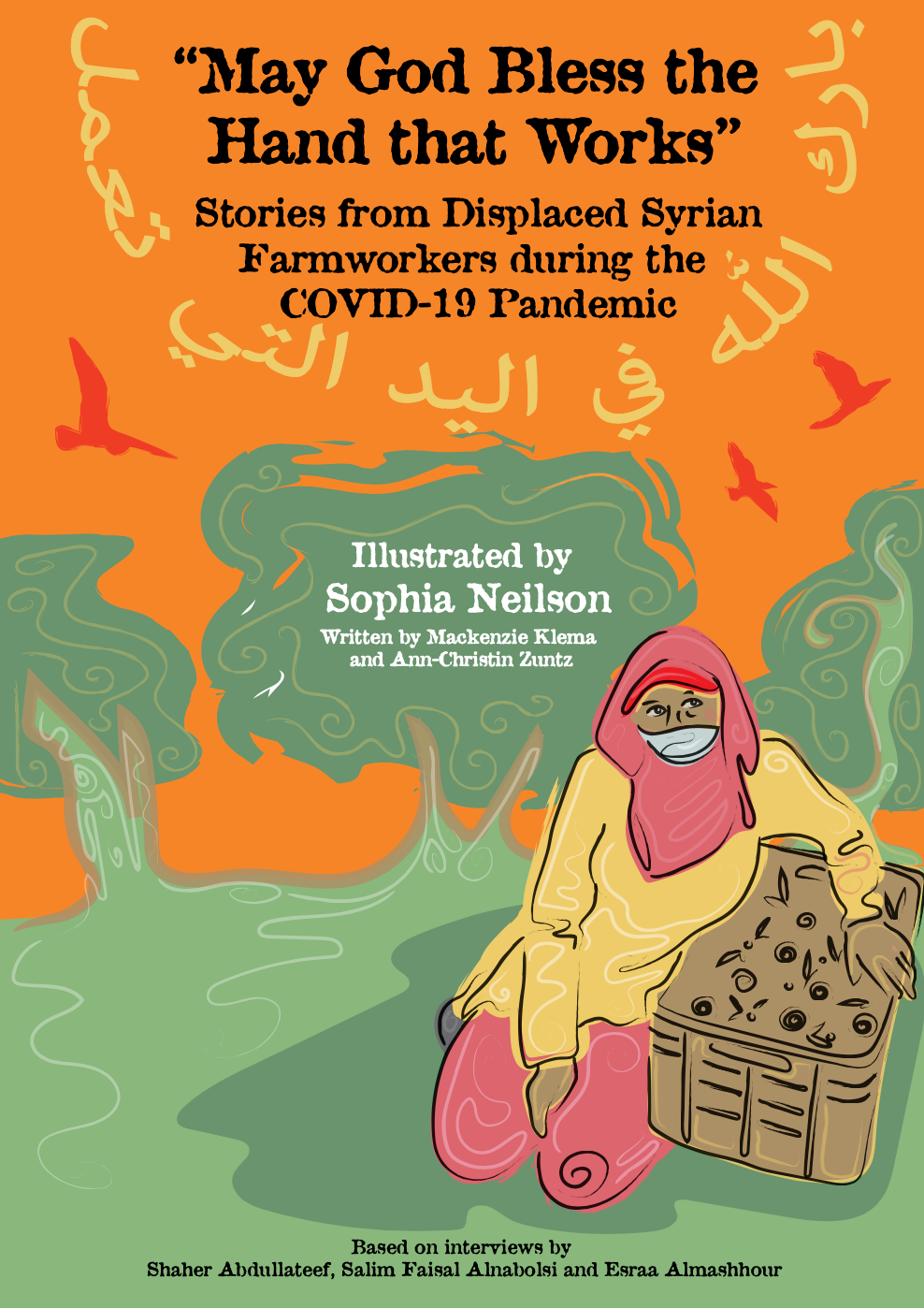Duration: October 2020 - June 2021
Funding Scheme: UKRI/AHRC call to address the impact of COVID-19 on modern slavery
Principal Investigator: Dr Ann-Christin Zuntz
The Challenge
For displaced Syrians working in agriculture, COVID-19 is not simply a health crisis, but also an economic crisis. Insights from our team’s From The Field project suggest that COVID-19 movement restrictions are disrupting Syrian farmworkers’ mobility-based livelihood strategies. With no financial safety net, low-skilled seasonal Syrian farmworkers are especially vulnerable to price hikes for food and public transport. Social and legal marginalisation in host countries, as well as refugees’ position at the bottom of segmented labour markets, put them at risk of exploitation. Yet, we do not yet know how exactly the pandemic has changed working conditions for refugees in the Middle East.
COVID-19 measures may have exacerbated unequal power relations between Syrian workers and their agricultural employers and intermediaries, forcing Syrians to change mobility patterns, work longer hours for reduced pay, and accept the withholding of wages. They might have also increased paid and unpaid labour for female refugees. There is an urgent need to understand how the social and economic relations that underpin refugee labour, and bind displaced Syrians to middlemen and employers, are reorganised when global agricultural supply chains are interrupted and workers’ mobility is restricted.
Publications
Zuntz et al. (2025). “Bread, salt and book-keeping. The shaweesh as the interface between Syrian refugees and the humanitarian system in Lebanon.” In Refugee Governance in the Arab World: The International Refugee Regime and Global Politics, ed. by Tamirace Fakhoury and Dawn Chatty, 201-228. London: I. B. Tauris. Open access - download here.
Zuntz et al. (2021) Precarious Labour under Lockdown: Situation Analysis Report
Zuntz et al. (2021) Precarious Labour under Lockdown: Situation Analysis Report (türkçe versiyon)
Zuntz et al. (2021) Precarious Labour under Lockdown: Situation Analysis Report (عربي)
May God Bless the Hand that Works
A graphic novel telling the stories of displaced Syrian agricultural workers in the Middle East during the COVID-19 pandemic.
Research Aims
Funded by the Arts and Humanities Research Council (AHRC), in collaboration with the Modern Slavery and Human Rights Policy and Evidence Centre, this project investigates how humanitarian solutions could mitigate the impact of COVID-19 measures on displaced Syrians’ vulnerability to exploitative labour in agriculture in the Middle East. Using remote semi-structured interviews and ethnographic “work diaries” with Syrian workers, agricultural intermediaries and employers, the project explores how COVID-19 measures have reshaped Syrian farmworkers’ economic hardship, freedom of movement, gender dynamics, and relationships of dependency with agricultural middlemen and employers in northern Syria, Jordan, Lebanon, and Turkey.
Outcomes and Impact
The lack of a coordinated aid response at the regional level has turned Middle Eastern countries into a laboratory for fostering refugees’ economic self-reliance. Sadly, getting refugees to work is not emancipating in itself: refugee livelihoods programmes have had limited success because of their narrow economic focus, and because they fail to address displaced people’s lack of rights. Insights from our SyrianFoodFutures project suggest that NGO-led vocational trainings for Syrian farmworkers seldom lead to jobs because they do not remedy structural barriers, including lack of social security and language skills (in Turkey), and unequal power relations with middlemen. This research will reformulate the question: instead of producing more (exploitative) jobs for refugees in the Global South, how could humanitarian action create decent jobs, and, by extension, healthier and dignified lives?
Through co-designing the research, and co-producing outputs together with Syrian academics affiliated with CARA and policy experts from Development Workshop, the project formulated practical and culturally sensitive humanitarian solutions to tackle labour exploitation. It provided evidence for better humanitarian livelihood programmes which will help refugees transition into more decent and safe employment and make them more resilient to economic shocks. In the long-term, research findings will inform advocacy aimed at policymakers that acknowledges displaced Syrians’ contribution to host countries’ economies, and strengthen their protection not only as refugees, but also as workers.
Besides academic articles, outputs include a situation report for national and international policymakers, aid providers, and agricultural actors, in English, Arabic and Turkish. The report was launched at an outreach workshop in March 2021.
In a Nutshell - Research Findings
Recording of our May 3rd 2021 outreach seminar describing key research findings in the Situation Analysis Report
As part of a webinar series on Mobile Humanitarians, featured on the public anthropology website Allegra Lab, Ann discusses our research findings and puts them in the wider context of multiple mobilities during displacement. More information here: https://allegralaboratory.net/mobile-humanitarians-mobilities-after-displacement/
Remote Ethnography and Ethics of Representation
The drawing to the right shows the tent of Syrian workers in Turkey. It is based on a photo, taken in September 2020, that was shared with us by our partners Development Workshop. The inscription on the tents means: “Knock on the door before you come in.” This drawing encapsulates one of the ethical challenges that we face in this project: the need to respect and protect Syrian refugees’ privacy, and boundaries of intimacy. Publishing ethnographic data about refugees’ work in the informal economy may put them at risk of prosecution by host country authorities, and provoke acts of retaliation from agricultural intermediaries and employers. From previous research, we also knew that Syrian women are often uncomfortable with sharing pictures and videos of themselves with researchers, especially men. This project collected visual ethnographic data in the form of remote “work diaries”, through which participants documented a “day at work” with their smartphones. However, instead of sharing these data with the wider public, they formed the basis for a graphic novel, illustrated by artist Sophia Neilson. Through documenting Syrians’ experiences of suffering, resistance and solidarity, the graphic novel is a counterpoint to victimising representations of refugees, and can inspire more realistic portrayals in humanitarian marketing, the media and academic writing. It is available in English, Arabic, and Turkish, to make sure it can be shared with the refugees whose life stories have shaped our research.





















